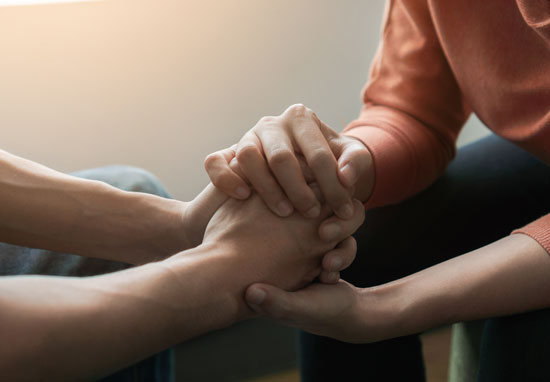Holistic Addiction Treatment
in Los Angeles, CA
Holistic addiction treatment is an approach that can complement >traditional rehab by addressing overall well-being, mindfulness, and more. Although it’s extremely beneficial, holistic addiction treatment is not typically used as the sole treatment approach for those who are working to overcome addiction. Instead, a holistic addiction treatment program can combine with a traditional rehab program to help individuals work toward recovery.
Holistic activities are nonmedicinal, alternative methods that can according to a patient’s personal needs. Holistic drug rehab programs in California, such as ours here at CNV Detox, can help those who are struggling to end addiction. The use of holistic methods can begin as early as during detox, and be a part of the treatment program until the very end.
If you need FREE help please contact the National Helpline about mental and/or substance use disorders, prevention, treatment, and recovery in English and Spanish.
What is the Goal of a Holistic Addiction Rehabilitation?
The goal of a holistic approach is to help improve both mental and physical health. This type of treatment works to “align” a person’s physical and mental health during treatment. The process of recovery can drain patients as they adapt to their new, sober reality. Holistic therapy can help promote their well-being and state of mind, helping patients to feel better while also increasing the chances of recovery.
The best thing about a holistic mental health treatment facility is that it addresses issues regarding addiction specifically while also helping people in other ways. Holistic therapy can also be a great option for people suffering from mental disorders as well. This makes it perfect for dual diagnosis patients, dealing with both addiction and other mental health issues. For example, people can attend holistic treatment centers for depression, anxiety, and more.
Some holistic activities, like meditation, are meant to fight anxiety, which makes them a great tool even after addiction treatment. General physical conditions and issues can make this process a little more difficult. Trouble sleeping, muscle aches and tension, and many other issues can be problematic during treatment. In many cases, these symptoms lead to relapse. Thankfully, those who are seeking holistic rehab in California can benefit from this type of treatment and work to overcome addiction once and for all!
What are Common Types of Holistic Rehabilitation?
There are many different holistic activities to choose from, each with its own benefits. Many holistic rehab centers in California and other areas will offer the most mainstream, popular options available. Others might opt for experimental and/or more hands-on activities.
Of course, the types of holistic approaches available to you will depend on the treatment center you attend. But, some of the most common holistic activities offered by addiction treatment centers are:
Meditation
Individuals can use multiple techniques to engage in meditation. This holistic practice is often used for many different purposes. The goal of most meditation techniques is to improve mental health through breathing and mental exercises. Many people find that meditation reduces stress, controls anxiety, increases self-control and self-awareness, enhances focus, and promotes emotional health.
Yoga
Practicing yoga works both on mental and physical health as well. Yoga is usually led by an instructor and can be done individually or in groups. In yoga, you hold different positions meant to heal different parts of the body and mind.
Specialists believe that each position “activates” points of the body that are linked to different parts of your health. As it is with meditation, yoga also helps reduce stress levels, as well as fight anxiety and depression.

Tai Chi
Tai Chi is a form of martial arts that originated in China. It is meant to be used for self-defense and to improve health and vitality. With time, Tai Chi has been recognized as a tool to promote physical fitness and balance. It is practiced through slow movements, which help the flow of body energy. The philosophy behind it is to become more aware of how actions affect your health and, consequently make better choices. It helps with focus, stress management, and emotional balance.
Acupuncture
Acupuncture is an ancient Chinese technique that stimulates pressure points, which, in turn, will promote the healing of various parts of the body. Acupuncturists insert sterilized, thin needles into certain points of the body to help encourage and activate healing and relief.
All points are linked to different systems, such as the endocrine, immune, cardiovascular, digestive, and nervous systems. During addiction treatment, acupuncture can help balance these systems, which have been affected by long-term addiction.
Nutrition
Working on diet and nutrition is an effective way of helping the body become healthier again. However, dieting, in this case, will not be about an ideal weight or body. It’s about making sure patients are getting all the nutrients they need for the body to heal and work on achieving balance again. What you eat can directly affect mood, energy, and general health, and therefore, your ability to recover.
What are Some Alternative and Holistic Therapy Options?
Apart from sessions considered holistic, many treatment centers offer other non-conventional forms of therapy. Some originate from ancient practices, like drumming circles, that have been adapted to the needs of people in recovery. Others designed more recently use science and experimentation to back up their efficiency.
Many non-conventional forms of therapy will help you practice new skills, which can be beneficial for those in recovery. While these approaches help you in the same way holistic activities do, they also work on social and empathy skills. They can create great opportunities to connect with new people who understand what you’re going through.

Art Therapy
Addiction treatment programs can incorporate different forms of art therapies. Art therapy is a way to allow patients to express themselves and explore their emotions and thoughts. It’s especially recommended for those whose addiction was triggered by a history of abuse. As mentioned, you don’t need to have previous experience to be able to participate in art therapy sessions.
Patients can participate in all art media – painting, sculpting, drawing, acting, music, dancing, writing, or poetry. What is more important is using it as a way for therapists to use therapy techniques. There are 3 techniques used as the basis for any kind of art therapy:
Gestalt Methods
Gestalt methods help patients figure out and work on their feelings, mindset, and experiences. The art is a means of introducing the underlying psychological issues into the conversation in order to discuss these issues clearly. Likewise, the patient can express themselves through art, too.
“Third-hand” Approach
As the conversation goes on, this technique can be applied subtly throughout the session. The therapist can help as the patient works on their art. While the art would express their vision, the therapist can aid in the production. That way, they can better express themselves as they are working on it, feeling more productive and fulfilled.
Active Imagination
As the patient works on art, their mind will be at work and prone to making free associations. As the process goes on, it can put them in a more introspective mindset, and therefore process their feelings.
Wilderness Therapy
Wilderness therapy is experiential and it works to generate feelings, beliefs, attitudes, and reactions below the level of awareness. These experiences help patients examine their emotions and tendencies in order to understand or even change them.
During sessions, a guide will aid a group as they participate in outdoor activities. Engaging in said sessions can only be productive for therapy-related goals if the activities are guided, they are not done at random.
Adventure and wilderness therapy, also called outdoor therapy, can take form through different activities. This can include zip line excursions, backpacking, rock climbing, canoeing, camping, hiking, and many other outdoor activities.
As the group participates, some of the benefits that come from working together during these activities are:
- Building self-confidence
- Developing goals and planning skills
- Finding out more about strengths and weaknesses
- Working on communication skills and teamwork abilities
- Generating insights on their personal motivations, feelings, and beliefs
- Learning more about how to deal with disagreements in a productive, positive way
Massage Therapy
Massage therapy has many variations, all designed to ease the physical healing process. Addiction can take its toll on the body, and many withdrawal symptoms might also wear patients out physically.
Drugs like opioids and benzos can all trigger symptoms during detox that will damage the muscle tissue. From muscle spasms to physical exhaustion, the body needs as much care as the mind during this time.
Addiction centers can use multiple massage techniques on their patients to promote healing. They each work on different issues and parts of the body. Shiatsu, for instance, works on boosting energy, while deep tissue massages will work on posture and chronic problems. This would depend on the patient’s specific needs.
There are numerous benefits to massage therapy, which include:
- Increasing circulation
- Reducing anxiety, agitation, promoting relaxation
- Releasing pleasure hormones, like serotonin and dopamine,
- Decreasing cortisol levels, which are directly related to stress
- Improving the quality of sleep and helping regulate sleeping cycles
- Speeding up the process of flushing out metabolic waste and toxins.
- Helping connection to the body and body awareness
- Building trust and interpersonal skills
Holistic Drug & Alcohol Rehabilitation Programs at Our California Facility
Addiction treatment can be much more in-depth and effective with holistic therapy sessions and activities. In the long run, they will give you tools to help you deal with the changes in your lifestyle and with life in general. At CNV Detox, we know that recovery should be a process for healing, not just overcoming addiction.
We can provide you everything you need during treatment to ensure long-lasting sobriety and improvements in your health. Comfortable and relaxing environments are our top priority so that we can properly support all our patients.
If you or a loved one are looking for a California substance abuse treatment center, contact us today. Our team can provide you with all information regarding program options, requirements, insurance coverage, and more. No matter where you are in your healing process, we will help you make it through your end goal – a healthy, happy life.
Take the Next Step
The path to recovery is only one step away. Begin your treatment at CNV Detox in Los Angeles, California as soon as the same day. For your convenience, we work 24/7. Our team is ready to help as soon as you reach out.



















